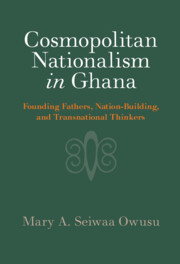Book contents
- Cosmopolitan Nationalism in Ghana
- Cosmopolitan Nationalism in Ghana
- Copyright page
- Dedication
- Contents
- Figures
- Tables
- Acknowledgements
- Abbreviations
- Maps
- Introduction
- 1 Ghana’s Grand Narrative
- 2 Rethinking Proto-Nationalism
- 3 Rethinking Cultural Nationalism as Debates on Synthesis (1887–1920)
- 4 Misreading Conservative Nationalism (1920–1945)
- 5 Rethinking the Monopoly of Radical Nationalism (1946–1958)
- Conclusion
- Bibliography
- Index
Introduction
Published online by Cambridge University Press: 12 December 2024
- Cosmopolitan Nationalism in Ghana
- Cosmopolitan Nationalism in Ghana
- Copyright page
- Dedication
- Contents
- Figures
- Tables
- Acknowledgements
- Abbreviations
- Maps
- Introduction
- 1 Ghana’s Grand Narrative
- 2 Rethinking Proto-Nationalism
- 3 Rethinking Cultural Nationalism as Debates on Synthesis (1887–1920)
- 4 Misreading Conservative Nationalism (1920–1945)
- 5 Rethinking the Monopoly of Radical Nationalism (1946–1958)
- Conclusion
- Bibliography
- Index
Summary
The commemoration on 6 March 2007 of the fiftieth anniversary of Ghana’s emergence from eighty years of British colonial rule exposed not only a bitter national divide over whom to credit with the nation’s founding, but also the possibility that a flawed ‘Grand Narrative’ of Ghana’s modern history is the source of this abiding threat to national unity. In marking the Golden Jubilee, the government of the day, led by President John Kufuor of the New Patriotic Party (NPP), honoured heroes of both the national and continental struggles for independence. On the national level, the NPP chose to celebrate the collective known in Ghanaian historical folklore as ‘The Big Six’, the leadership of the post-World War II United Gold Coast Convention (UGCC) nationalist movement.
- Type
- Chapter
- Information
- Cosmopolitan Nationalism in GhanaFounding Fathers, Nation-Building, and Transnational Thinkers, pp. 1 - 28Publisher: Cambridge University PressPrint publication year: 2024

